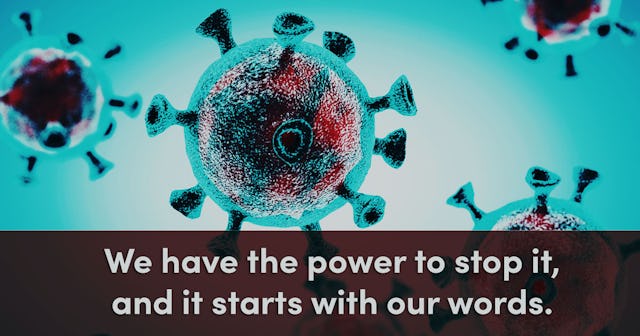Saying Things Like "Chinavirus" Is Racist And Violent

It all began with #45 openly referring to the coronavirus as the “China Virus.” What do you think happened next? There was an increase in hate crimes against East Asian people. The pandemic was scary enough, but then to add insult to injury, with the violent attacks on Asians, it was all too much. In each one of Trump’s public speeches about the coronavirus, he took a dig at Chinese people or Asian people. And since March, here in the United States, there has been a 150% increase in hate crimes against Asians, primarily in New York and Los Angeles, but not exclusively in those places. Hate is on the rise, and it all started with the rhetoric of one poorly informed president.
What we have now are scientists who are perpetuating racism by referring to different strains of the coronavirus by where they originated instead of something more scientific like SARS-CoV- 2; as a result, what we have are words like the “Brazilian strain” or the “African variant” permeating our brains — and for some, fueling the fire that #45 started.
Let’s take a deeper look at what is happening to our brains when we hear things like “the Brazilian strain” or the “China variant.” It stirs up drudge, perhaps drudge that was once buried deep down in some place in our minds. The World Economic Forum states that “Human brains are hardwired to take shortcuts when processing information to make decisions, resulting in ‘systematic thinking errors’, or unconscious bias.” If we hear things long enough, we start to believe them. So when we hear “China virus” or “South African variant,” our minds — if we aren’t aware of the fact that the reference is talking solely about where the variant came from and not the people — are susceptible to holding something against an entire ethnicity. The perceived “something” would be that due to some negligence on their part, our lives are at risk — which is just not true.
Unsplash
The coronavirus or SARS-CoV-2 is a virus that does not discriminate, and we must not discriminate either. We already have enough to lose — like our lives — if we cannot recover from the virus. Saying things like the “Brazilian variant” or the “U.K. variant” perpetuates another kind of bias, an affinity for staying in our small circles and not interacting with others, in essence only surrounding ourselves with similar people. According to the organization Lean In, “Affinity bias is what it sounds like: we gravitate toward people like ourselves in appearance, beliefs, and background. And we may avoid or even dislike people who are different from us.”
This is exactly what we see happening to the AAPI community. Karthick Ramakrishnan, founder and director of AAPI Data, a demographic data and policy research nonprofit, told NBC News, “Trump’s rhetoric helps set a certain narrative in place — and presidents have an outsized role in terms of shaping narrative. They don’t call it a bully pulpit for nothing, and especially Trump, the way he frequently used Twitter as well as press conferences and off-the-cuff remarks to campaign rallies to frame the narrative in a particular way, it likely played a role.”
For four years, Trump’s words fueled hate and it blew up in March 2020, just as the cases of coronavirus increased — but this time, it ignited hate and harm against Asian Americans. What we know about racial bias is that it can be explicit or implicit and no matter how that racism is delivered, it can still cause harm emotionally and physically, and neither form is okay. We live in a culture that has far too long turned a blind eye to the issue of racism in our country. If nothing else, Trump’s rhetoric forced us to open our eyes to the hate.
We have the power to stop it, and it starts with our words. What we say, the words that we choose, matter — and always will.
In February 2020, a college student named Jonathan Mok from Singapore was attacked on the streets of London. The people who chose to harm him yelled they did not want the coronavirus in their country. Mok shared a powerful response on social media, along with a photo of his bruised face. “Racism is not stupidity — racism is hate,” he wrote. “Racists constantly find excuses to expound their hatred — and in this current backdrop of the coronavirus, they’ve found yet another excuse.” And he is exactly right.
In order to stop the racial stigma perpetuated by the various terms for the coronavirus, we must call it by its name — not its country of origin. Let’s stop referring to it by anything other than what it is: a disease that has no face, no race, or ethnicity.
This article was originally published on